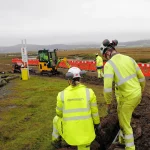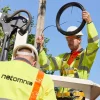UPDATE2 UK Pushes “Unworkable” National 2G Mobile Network Roaming
The Government’s Culture Secretary, Sajid Javid, will this week shun objections by the United Kingdom’s largest mobile network operators (EE, Vodafone, O2 and Three UK) when he launches a new consultation on proposals that could force the operators to improve mobile reception in rural areas through greater sharing of key infrastructure (wireless masts etc.).
According to the telecoms regulator, Ofcom, over 99% of premises in the United Kingdom can receive both 2G and 3G based outdoor mobile network coverage from at least one operator (rising to 73% for 4G). But as most people have experienced the predicted percentages are a poor reflection of reality and overlook the fact that coverage “not-spots” still persist in many locations, which the regulator said was a particular problem for “some rural areas“.
Advertisement
Similarly even some well-served areas can have not-spots, which most often occur due to issues like the topographical height of local terrain (hard luck if your house exists in a strong vertical dip of the surrounding terrain), forests and large buildings that can obscure reception etc.
Part of this problem will be solved by the Government-backed £150 million Mobile Infrastructure Project (MIP), which is working with Arqiva to build new masts at various points around the United Kingdom. But this will only benefit around 60,000 premises (the original plan sought to help 900,000 premises before being scaled back), which will leave many others isolated and also ignores the more familiar problem of maintaining good reception during travel.
Meanwhile the EU’s proposal to end roaming charges has added an additional dimension because in some parts of the country it’s already easier to make calls by connecting to an operator in France than the United Kingdom. In that respect it’s understandable that the Government might wish to tackle this issue, especially as it’s likely to be a vote-winner ahead of next year’s General Election.
A Whitehall source said (The Telegraph):
“We want to eradicate this situation of partial not-spots … There is expected to be a consultation in the coming days and this could include a legislative option. If these companies do not change, we might force them to change.”
But forcing mobile operators to share infrastructure isn’t popular with everybody. The Mobile Operators Association said during September 2014 that such an approach would be “Unworkable … national roaming isn’t the silver bullet that is being suggested. It will take years to implement and will not address the problem of notspots. National roaming would be a disincentive to build more infrastructure. And it is technically difficult and expensive to set up national roaming, and customers would face more dropped calls.”
Advertisement
Most commercial mobile operators have spent billions to give their respective networks an edge and would thus see little incentive from sharing that advantage with rivals, which may not have made the same investment. Similarly the operators might be discouraged from making future investment for fear that rivals would get a free ride. All this comes at a time when Ofcom is still threatening a huge licence fee hike (here).
The MOA suggests that it would be better to tackle the issue by reforming the Electronic Communications Code (ECC) and removing barriers, such as costly business rates in rural areas and expensive backhaul / power supplies. But the Government appears to now be pressing forward with its roaming plan despite the commercial concerns.
We’ll update this article once the consultation has been published.
UPDATE 5th November 2014
Advertisement
As predicted the Government has today set out their plans to eliminate poor mobile coverage that “blights a fifth of the UK“.
Sajid Javid, Culture Secretary, said:
“I’m determined to ensure the UK has world-class mobile phone coverage as investment in infrastructure will help drive this Government’s long-term economic plan.
It can’t be right that in a fifth of the UK, people cannot use their phones to make a call. The Government isn’t prepared to let that situation continue.
We’ve been talking to the mobile companies about the problem and they are working with us to find a solution.
This consultation will complement the work industry is doing and allow the Government to hear from the wider telecoms sector, businesses and the public.
Businesses have been clear about the importance of mobile phones and improved coverage will help deliver jobs and economic security.”
At the time of writing we can’t find a copy of the consultation document (it’s not online yet), although we’re told by the Government that it will run until 26th November 2014. Never the less we known that it will propose infrastructure sharing, reform of existing virtual network operator agreements (i.e. to allow for national roaming) and a new coverage obligation to support the approach, although for now this would be limited to 2G services (mostly just voice calls). This makes sense since applying it to 3G and 4G might damage any incentive for future investment, although getting the balance right may be difficult.
Meanwhile, in a somewhat odd twist, the Government’s already embattled Home Secretary, Theresa May, is said to have privately warned Sajid Javid that the mobile roaming proposals would make it more difficult for GCHQ and Police to snoop on peoples phone calls because it would prevent them accessing “information that is crucial to keeping us safe“.
UPDATE 5th Nov – 10:32am
It took longer than we expected, but the Government’s consultation is now online (here). The document states that up to 21% of UK landmass is affected by partial not-spots. These are areas in which mobile phone coverage is provided by one or two of the UK operators (Vodafone, O2, EE and Three), but not all four.
Partial not-spots affect a greater proportion of the country than complete not spots irrespective of how coverage is measured: 3% of UK premises, 10% of A roads, 16% of B roads and 21% of landmass. Any measures implemented to solve this issue are envisaged as being able to “deliver additional coverage at the earliest point possible“, with the ideal date being pegged as by the end of 2016.
The Capex costs for the Government’s proposal are estimated as £64m-£128m, while Opex sits at £26m-£32m per annum.
Mark is a professional technology writer, IT consultant and computer engineer from Dorset (England), he also founded ISPreview in 1999 and enjoys analysing the latest telecoms and broadband developments. Find me on X (Twitter), Mastodon, Facebook, BlueSky, Threads.net and Linkedin.
« DEFRA Committee Launch Fresh Inquiry into UK Rural Broadband Provision
















































Comments are closed